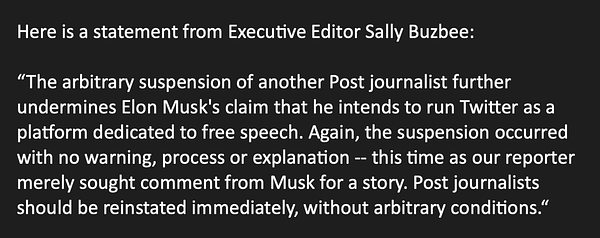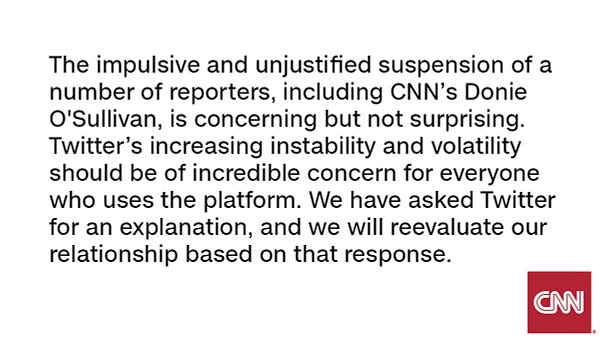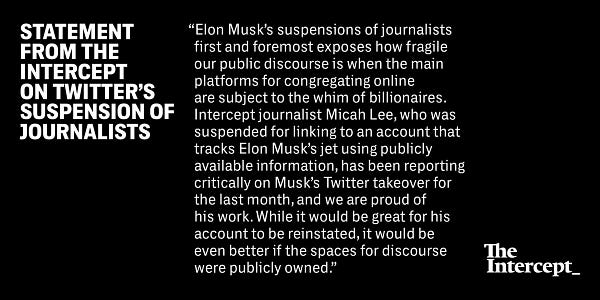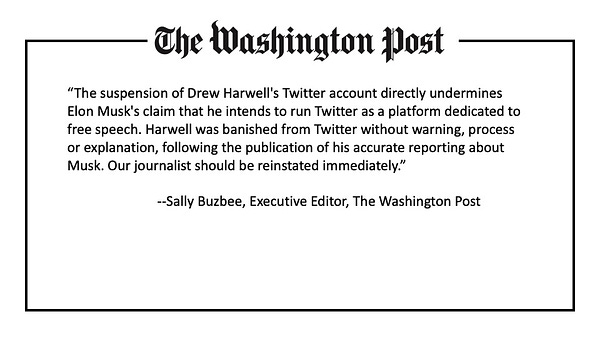Dear Newsroom Leaders: Now's Your Chance to Banish Twitter From Your Newsroom
For years, Twitter has encouraged bad behavior by reporters and damaged the mainstream media's image. Now, you can finally get your employees off it.
Dear readers,
Elon Musk and other Silicon Valley bigwigs hate the mainstream media (partly for good reasons) and mainstream reporters hate him (also partly for good reasons). And yet I can’t shake the feeling that he has done the mainstream media a solid by buying Twitter, and that the best possible thing that could happen for the media is if he burns the place to the ground.
The reason is that Twitter has had hugely net negative impacts on mainstream news organizations, and so forcing a divorce is likely to help those outlets run better by reducing conflict and saving reporters from their worst instincts. Twitter has been addictive, quite literally — it distracts reporters from their work, distorts their judgment about which opinions are normal and which stories are important, and provides them a platform to air the industry’s dirty laundry in public. Now, by buying Twitter and placing himself closer to the center of the news cycle every day, he has further intensified that media-distortion field in a way that generates excessive coverage for himself.1
To the extent Musk’s ownership and management choices make reporters feel icky about tweeting so much, that’s great. Even more promisingly, he’s created an opening for managers to do what they ought to have done long ago: Order their employees to drop their Twitter addictions, stop sharing their pithy opinions in an effort to build a personal brand, and get back to work.
Management is already angry about Musk’s actions, demanding that Twitter stop arbitrarily suspending their employees for offending his whims. Here’s a selection.


But the demands here are backwards. Instead of demanding that Taylor Lorenz be allowed to resume her incessant tweeting, Buzbee should have pulled her and the rest of the Post’s employees off the platform. Same for the other outlets. This is the industry’s great chance to take back control and end Twitter’s longstanding distortion of news outlet priorities.
Twitter’s benefits are overstated and its drawbacks are large
For media outlets, Twitter has some limited use cases. It helps reporters find leads and it quickly surfaces interesting stories — both stories that outlets have just published and events that could be stories. It also drives some traffic to news stories, but not as much as some people (including Elon Musk) seem to think. Google and Facebook are much larger drivers of traffic, and not that many people use Twitter. Those who do very often share tweets about stories without ever actually clicking the links.
But mostly, I think Twitter has done a lot of damage to news organizations.
One problem is that Twitter’s usefulness for reporting has sometimes turned into a dependency. Social media has replaced some of the critical work of reporting and network-building. Newsrooms have come to rely on Twitter and other platforms for “crowdsourcing” and cheap “user-generated content.” While this can be efficient (in that it connects reporters to sources they might not find otherwise), it’s also biasing and distorting — the loudest voices on Twitter within a given field, such as medicine, often aren’t representative of broad opinion within the field.
And that’s just the start of the problems Twitter was creating for mainstream outlets, even before Elon expressed interest in buying the platform. Here’s what else it wreaks:
Journalists waste a lot of time on Twitter, writing tweets that don’t make their employers money instead of stories that do.
Twitter has made it very difficult to enforce editorial standards. Reporters constantly use Twitter in ways that editorial guidelines would never allow in a newspaper — speculating, sharing unverified information, and most of all, expressing a lot of opinions.
Twitter has made the liberal bias of the staffers at prestige media outlets more obvious than it was before, damaging the trust that ideologically diverse Americans once had in mainstream outlets. I’m talking not just about trust from readers, but also trust from sources that outlets need to speak with to develop a holistic view on stories, especially political stories.
Twitter has exacerbated that bias by promoting groupthink — liberal reporters feel emboldened to share their views, and to seek to reshape their outlets’ coverage around the ideologies whose dominance among reporters has been demonstrated. Meanwhile, those whose views don’t fall within the dominant liberal strain feel compelled to keep quiet so they don’t get yelled at — or they end up here on Substack.
Instead of reining in their employees’ behavior on Twitter, many media outlets have relaxed their editorial standards to better align with Twitter culture. Places like The New York Times — having observed that their staffs are constantly expressing their biases out in the open, in a format that admittedly gets a lot of engagement — have increasingly brought that viewpoint-driven journalism into their news pages, becoming explicitly liberal rather than implicitly so.
Twitter has impaired news judgment. Reporters who stare at Twitter all day marinate in the stories and the viewpoints about those stories that dominate on the platform, which means they’re seeing disproportionately liberal takes on disproportionately culture war-inflected topics. This encourages news outlets to spend more time than they otherwise would on outrage-bait and less on topics without obvious culture war valence.
People who are subjects of news coverage know Twitter is a reality distortion field, and they use it for ref-working. Max Tani wrote this week for Semafor that the White House mainly sees Twitter as mainly useful for two things: “Selling its message to journalists and other influential figures,” and “Encouraging friendly activists to put pressure on those elite voices.” In other words, they see Twitter as being where the likes of Scott Dworkin and “Brooklyn Dad Defiant” can pump out White House talking points and push journalists to adopt their preferred frames in stories.
Twitter, along with Slack, has fostered newsroom revolts. Newsroom-wide conversations provide a forum for employees to rise up and seek to explicitly control business strategy decisions — see the chorus of New York Times employees claiming pretextually that an op-ed they didn’t like from Sen. Tom Cotton was creating a workplace safety issue, successfully driving the newspaper’s publisher to fire its editorial page editor. Of course, a lot of people like the idea of more worker power, but the workers here tend to have bad ideas about how to run a news organization because they are so ideologically unrepresentative.
Given all those problems, there’s an obvious question: Why have news organizations allowed their employees to use Twitter in ways that have interfered with their missions and business strategies?
The most important answer is that not all of them have: The Wall Street Journal and the Associated Press, to take two examples, have successfully kept their reporters professional on the platform, expressing themselves in ways that broadly align with how you can express yourself in those outlets’ news stories. Both the WSJ and the AP are unionized, so it’s not like having a union shop necessarily makes it impossible for management to set and enforce standards of conduct for social media.
But at other places, including the NYT, a culture has set in where reporters tweet a lot. They muse and they observe and they opine in a way that isn’t good for the NYT but is often good for those individual reporters — an example of a phenomenon
wrote about earlier this week, where star employees have gained unsustainable power at the expense of institutions.2 A big social media profile can help you get booked on television, and can therefore help you get a television contract that can add tens of thousands of dollars a year in compensation on top of a reporter salary. A big social media profile can catch the attention of managers at other outlets, making it easier for you to get hired. And being “famous” on Twitter is fun — getting immediate reactions for quick, punchy notes can be a lot more enjoyable than slogging through edits on more staid news articles.3So one reason it’s been hard to rein in reporters on Twitter is they have their own reasons for behaving as they do. Editors, wanting to retain these employees, or simply not wanting to have arguments, let slide a lot of opining from their employees.4 Because so much is allowed to slide, it becomes jarring when the rules do get enforced.5
Now, Musk is rendering the newsroom-Twitter relationship even more dysfunctional by turning himself into a daily main-character and hate figure for liberals and reporters (who are liberals). Like Donald Trump, his provocations engender counter-provocations, making reporters increasingly unhinged and increasingly loud about their opinions in a way that doesn’t end up making anybody look good. One reason to get reporters off Twitter is that it helps to break this cycle and get them focused again on what matters.
One nice thing about the Musk takeover is that even Twitter-addicted reporters will agree with some of this analysis: They worry about the power Musk’s ownership of Twitter can give him over the media landscape. They want to see his influence reduced, and they don’t like giving him their business. And they know that a key thing Musk and his fans want out of Twitter is a place to yell at reporters. Leaving the platform denies them that pleasure.
If I ran a prestige newsroom like the Times or the Washington Post, here’s what I would do. I would say we’re responding to his outrageous suspensions of journalists not by demanding they be reinstated immediately, but by pulling the entire organization off the site. Reporters will be told they’re not to tweet anymore — that Musk’s capricious management of Twitter, and his obvious disregard for the free speech principles he claimed animated him to buy the site, make it no longer an appropriate place for the discussion and dissemination of news. This argument has the virtue of being true — Musk really is restricting speech he doesn’t like in a way that interferes with the prerogatives of news outlets who might use his platform to disseminate content.
But most of the benefits of leaving Twitter would be unrelated to Musk. The staff wouldn’t be constantly speaking to the public without editorial review, providing constant reminders of their liberal bias. The loudest liberal voices on the platform would lose their excessive power to shape the conversation. And if they think of interesting things to say, they’ll be more likely to put them in the newspaper, where they actually help the organization make money.
Very seriously,
Josh
It is not at all clear to me that hogging so much attention serves Musk’s interests — in fact, I think it’s harmful to him financially — but for better or worse, he’s doing it.
Allison points out in her piece this isn’t just happening in media institutions. She sees this happening with the Royal Family, universities, public health, etc.
I have some personal experience for this — my Twitter presence has done a great deal to build my career. At some places where I have worked, my ability to draw attention on Twitter has also been good for the organization. But I have come around to the view that my social media presence was inherently incompatible with the job I once had as a correspondent for the Times; while I was there, I chafed at occasional management pushback about public comments I made, but in retrospect, they really should have reined me — and many of my co-workers — in a lot more.
A lot of editors are people who rose within organizations because they were good at reporting and writing — many of them are bad at personnel management.
For example, consider Ben Collins, a reporter who covers “disinformation, extremism and the internet” for NBC News, who has the standard-issue set of liberal political opinions for someone who works in that job, who technically works on the news side of his organization, and who has been running his opinionated mouth on Twitter for years without apparent complaint from NBC management. Finally, he got punished this month for blasting his opinions out to the world in a context involving Elon Musk. It’s understandable, given how long he was allowed to do what he was doing while calling himself a reporter, that NBC’s recent action struck many other reporters as capricious and unfair. But the real problem is that NBC didn’t act much sooner.











If Musk used $44B to buy Twitter only to destroy it and remove it from society, it will have been one of the great unintentional acts of public service this world has ever seen.
Just on a microeconomic level, there seems to be some disconnect here. We keep hearing about how
A) As Josh says, journalists are behaving irresponsibly on Twitter, damaging the credibility of their employers, and making the newspapers less profitable etc.
B) The newspaper industry is dying, there’s a massive overproduction of would-be journalists and other literary types, there’s fewer jobs in journalism every day and starting wages for a writer, especially in a major city, are unlivable.
The synthesis of A and B is that the newspapers hold the upper hand. Just tell your employees not to tweet! You don’t need an excuse. What are they gonna do?